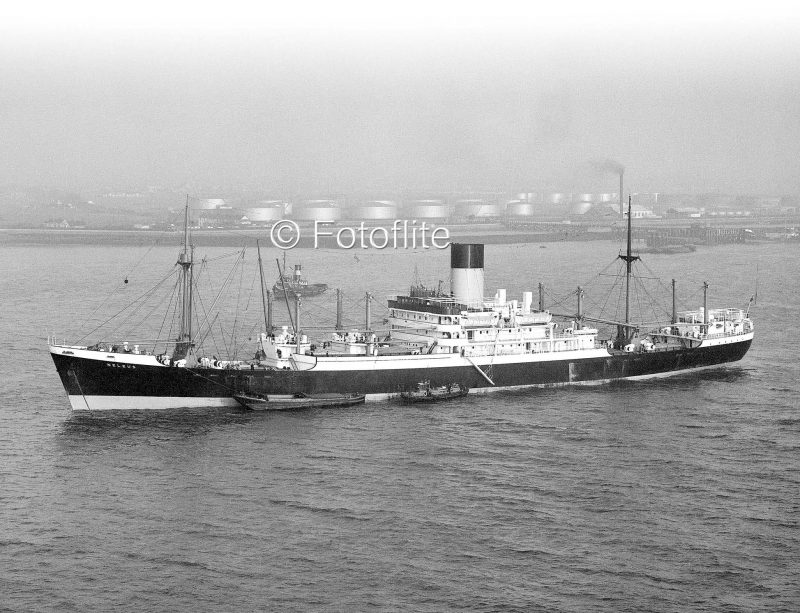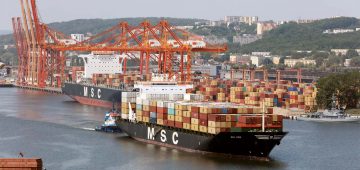Neleus and a Russian Odyssey
By Patrick Walters
February 1960
This tale is about a call at a Russian Port, but first a few tales about my three years on Neleus. In spite of having some rather restrictive skippers, what a time we had.
Neleus, and her two sister ships were lovely, steam turbine vessels. They carried no passengers apart from the occasional Aussie doctor on homeward runs.
Sydney was the usual turn round port, where we had a whale of a time, but Tasmania was also good. In Hobart we were hosted by the family of an Aussie doctor whom we had taken to UK on a previous voyage. He was Vernon Chen, and I met him years later when he was an orthopaedic surgeon in London.
His younger brother took us out into the ‘bush’ north of Hobart, and we went for a walk through a forest. In my naive way I said, “Thank goodness there are no venomous snakes in Tasmania”. I was promptly corrected by being warned to watch out for Tiger snakes. I couldn’t get out of that forest fast enough.
After Hobart we loaded apples at Beauty Point on the Tamar River in the north of Tasmania. I learned (from our Aussie doctor) how to play golf, after a fashion, viz. very badly! The only other diversion was an evening cruise on a small ferry boat which had a piano and a bar on board. By going ‘to sea’ this boat got round the licensing laws which applied on shore after 6 pm. The pianist could play, by ear, almost any tune we could name.
On that voyage we called at Antwerp before Liverpool, and went to Danny’s Bar, which was ‘gay’. We didn’t tell the Aussie doctor beforehand, but soon after we were seated, he turned to me and said: “There are two men dancing together, and one is wearing lipstick – what gives?”. I said: “Give me a kiss and I’ll tell you”. No, that last bit isn’t true.

as Aegis Fable, being renamed Aegis Trust the following year. She was broken up at Shanghai during March 1974. Photo: Fotoflite
Anyway, I digress. On one voyage, when we got to Melbourne on the homeward run, the agent came to my office with the news that we were going to Russia with an almost full cargo of wool for Novorossiysk (in the Black Sea). This stuff was for making army uniforms etc. There was also about 100 tons of other cargo for Belfast.
It was early February, and between Port Said and the Bosphorus we hit a northerly gale and had to hove-to for a few hours. Sailing past Istanbul we felt we could touch the shore, which was covered in frost.
On arriving outside Novorossiysk, after a few hours wait, we were taken by a pilot to a berth. The port seemed to be nothing more than a cement exporting place, dominated by a huge cement works. We were there for two weeks, and the temperature was about minus 15 most of the time. If we had touched the steel railings our fingers would have stuck to them.
The main agent was an attractive woman of German descent, with whom one of our colleagues had an ‘affair’. A local bank representative came aboard, and would change any kind of money, including Indonesian Rupiahs and Filipino Pesos, into roubles at a good rate.
Before we were allowed ashore, the immigration insisted that everyone’s discharge books were deposited with them, which sent our skipper spare.
Some of the catering staff were the first ashore, and quickly discovered that the best currencies were nylon shirts and Elvis records. We were never searched at the dock gates, so no problem getting these things ashore.

There were only two places worth going to in the evening, one a seamen’s club and a restaurant for the local well-offs, where we could drink Russian champagne all night for the price of a record or a nylon shirt. The seamen’s club sold a kind of brown cloudy beer which was rubbish, so we usually drank Bulgarian red wine. The agent’s side-kick was a pretty young woman, but her breath was heavy with garlic!
The female no.1 agent told one of our colleagues (who was a Gregory Peck look-alike, the lucky devil) to meet her one evening near the dock gate, but he should wear dark clothes, to blend in. I would add that, as it was so cold, we would wear our pyjamas under our trousers, with two sweaters, overcoats, and socks as gloves.
One afternoon a small group of us went ashore, and no sooner had we gone through the dock gate than a well dressed man wearing a Homburg hat, posh overcoat and gloves, approached us and said in near perfect English, “Hello boys, where would you like to go?” As we had no fixed plan we said, “Into town to post some letters”. He offered to take us there, and at the bus stop there was quite a queue. However, when the bus arrived the queue parted for us and our host like the Red Sea in the Bible. In the town, at the post office, the queue parted in a similar manner. Our host showed us the highlight of the town which was an eternal gas flame commemorating where the Germans had been turned back in WW2.
Our host, or should I say minder, asked whether we would like to visit a hospital or a school on another day, and we chose a school. When I asked him where we should meet him, he said not to worry about that, as he would find us, and he did! Obviously there was a tip-off system in place.
Sure enough, about six of us went ashore on the appointed day, and his nibs was waiting for us, and escorted us on a bus into town and to a school. We went up bare concrete stairs with bare concrete walls into a classroom, where we were greeted by the headmaster. He took us to a classroom of kids aged about 12, who sang a British song, in English, “Bobby Shaftoe”, I believe.
The headmaster then went into a 10 minute speech, translated by our ‘minder’, the gist of which was that we should all strive for eternal friendship and fraternity between the nations. I then had to make an impromptu speech in response, the contents of which I don’t recall, but it was short and sweet.
Finally, we were all presented with a big book, in English, about Kruschev’s recent visit to the USA. That was the occasion when he took off his shoe and banged it on the lectern during a harangue at the UN in New York. I wonder how all those books were conjured up at such short notice.
On the way back to the ship, our ‘minder’ told me he was a schools’ inspector, and I told him I didn’t believe that for one moment. He said he spoke four foreign languages, including English, German and Hindustani, and had learned English in Odessa from a former British army Major who had defected. He also boasted that, during the war, he had had forced his attentions on some Jewish women, of German descent, in Odessa. I said I wasn’t impressed with that behaviour. He wasn’t upset with my criticisms, but I think he twigged we had seen through him.
One evening, on the way back to the ship after a heavy session on the Bulgarian Red, the Aussie doctor picked up a heavy iron ball from a slag heap. Once on board, he proceeded to drop this ball and it bounced slowly and noisily down the internal stairs near the skipper’s cabin. This caused the skipper to shoot out of his cabin, asking what the hell was going on.
Before we left port, the Immigration Officer said there would be a delay while the holds were inspected to ensure they were left ‘clean’, which we all knew was to ensure that there were no Russian stevedores stowing away.
Although most aspects of life there were third-world by our standards, in the dockyard the steam locomotives were equipped with walkie-talkie radio phones. The Chief Officer, who was a train buff, was able to ride on one of these locos to his great delight.
We then proceeded to Belfast, where most of the crew were signed-off. I had the unenviable task of calculating all the wages and holiday pay at the last moment. When I had done this I went to the agent’s office and was handed a cheque for about £16,000. I cashed this at a bank, and took it with all the discharge books to the Shipping Master’s office for the signing & paying-off ritual. Thank goodness that there were no ‘troubles’ in Belfast in those days.
That evening we took the night ferry to Liverpool, where we arrived bleary-eyed the next morning.
What a trip!




Comments
Sorry, comments are closed for this item